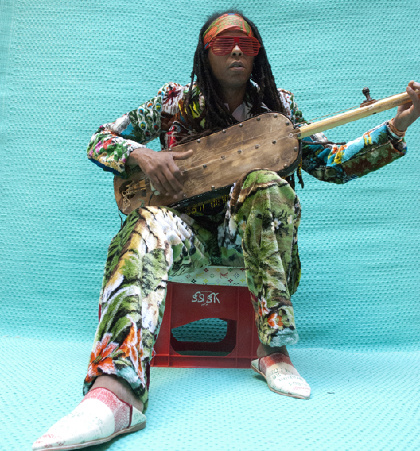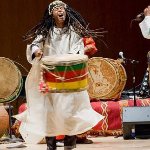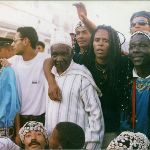- country:Morocco
- region:North Africa
- style(s):Gnawa, Mediterranean
- label:Hakmoun Music
- type:Composer/Songwriter
- gender:male
- instrumentation:instrumental, vocal
- artist posted by:African Hypertext LLC
Line up
- Hassan Hakmoun (sintir, 3-stringed, long-necked bass lute)
Links
Hassan Hakmoun began performing publicly in the Djemma el-Fna square of Marrakech during his very early childhood, and by the age of seven he had begun to play the sintir, a three-stringed long-necked African lute producing the bass tones which underlie the derdeba trance ceremonies of the Gnawa, Morocco's descendants of Black African slaves brought to the country centuries ago from the region of today's Mali. The derdeba ceremonies are all-night affairs wherein evil spirits believed to have inhabited particular persons or places are exorcised by the hypnotic playing and chanting of the assembled musicians.
The pentatonic scale and driving rhythms of the sintir are instantly appealing to many Western ears, and Hakmoun, more than any other Gnawa master musician, has succeeded in presenting this music outside of Morocco to widespread critical acclaim. With the considerable aid of British pop star Peter Gabriel who helped "discover" Hakmoun and released his first international album Trance on his Real World label in 1992, Hakmoun has fashioned an eclectic performing and recording career which has seen him enter into the worlds of jazz, world music, contemporary Western serious music and cerebral pop in startling collaborations with the likes of the late Don Cherry and Pharoah Sanders and The Kronos Quartet, as well as Gabriel himself. Gabriel has described Hakmoun's vocal capacities as among the most piercing and intriguing in the world.
Hakmoun emigrated to New York in the nineties but maintains a constant connection to his homeland and divides his time between New York and Marrakech. His recent associations with some of Morocco's most beloved Gnawa musicians have been heralded by some fans as a welcome "return to roots," yielding perhaps Hakmoun's most exciting works to date, spacious and free works, nearly orchestral in the scope of their aspirations yet gracefully loose - in the way ensemble music sounds best in almost any African culture. Through (or above) all of it that captivating voice so fondly praised by Peter Gabriel maintains a benevolent and tranquil mastery. In any Hassan Hakmoun performance, one is confronted with the incontrovertible evidence of a poised spirituality, hand-on-hand with a certain unbridled energy. The mixture can be breathtaking, at once free, passionate, and yet sweetly melodic.






